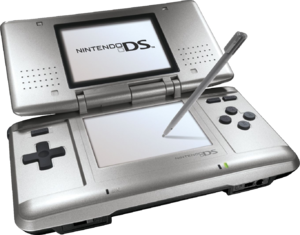Nintendo DS: Difference between revisions
No edit summary |
|||
| Line 9: | Line 9: | ||
The Nintendo DS was updated in the form of the [[Nintendo DS Lite]], a smaller model whose design borrows heavily from that of the [[Wii]]. The DS was further revised in the form of the [[Nintendo DSi]], the first DS update to include substantive differences, in 2009 (released 2008 in Japan). | The Nintendo DS was updated in the form of the [[Nintendo DS Lite]], a smaller model whose design borrows heavily from that of the [[Wii]]. The DS was further revised in the form of the [[Nintendo DSi]], the first DS update to include substantive differences, in 2009 (released 2008 in Japan). | ||
As of September 2008, combined sales of Nintendo DS and Nintendo DS Lite have reached more than 84 million units worldwide<ref name="earnings release Q3 2008">"[http://www.nintendo.co.jp/ir/pdf/2008/081030e.pdf#page=11 Consolidated Financial Highlights]" 11. [[Nintendo]] (2008-10-30). Retrieved on 2009-01-07.</ref>. | As of September 2008, combined sales of Nintendo DS and Nintendo DS Lite have reached more than 84 million units worldwide. In 2009, the new Nintendo DSi has been released in the USA.<ref name="earnings release Q3 2008">"[http://www.nintendo.co.jp/ir/pdf/2008/081030e.pdf#page=11 Consolidated Financial Highlights]" 11. [[Nintendo]] (2008-10-30). Retrieved on 2009-01-07.</ref>. | ||
==Pokémon games== | ==Pokémon games== | ||
Revision as of 02:44, 13 August 2009
The Nintendo DS is Nintendo's most recent addition to their handheld lineup. It was released in November 21, 2004 in North America and Japan, and March 11, 2005 in Europe.
Unlike previous Nintendo handhelds, it was not given the "Game Boy" moniker, likely because Nintendo did not want to tarnish the brand name if the system did not prove to be popular, as the earlier Virtual Boy had not been. The system features a significant overhaul from previous Nintendo handhelds, most notably its use of two screens, rather than one, to display gameplay. The bottom screen is touch-sensitive, adding a new aspect to gameplay. In addition to this, it has improved sound functions, including two speakers instead of the lone speaker that appeared on Game Boy models, and a microphone.
Built into the DS is the ability to connect to the Internet using the Nintendo Wi-Fi Connection. Many games have been released with specific features to utilize this capability, and while many do not, most games at the very least use the DS's internal DS-to-DS wireless connection. The DS is also compatible with Game Boy Advance games through its bottom slot, though compatibility for Game Boy and Game Boy Color games has been removed. Likewise, the multiplayer functions of GBA games are not supported.
The Nintendo DS was updated in the form of the Nintendo DS Lite, a smaller model whose design borrows heavily from that of the Wii. The DS was further revised in the form of the Nintendo DSi, the first DS update to include substantive differences, in 2009 (released 2008 in Japan).
As of September 2008, combined sales of Nintendo DS and Nintendo DS Lite have reached more than 84 million units worldwide. In 2009, the new Nintendo DSi has been released in the USA.[1].
Pokémon games
- Pokémon Dash (racing game, 2004)
- Pokémon Trozei! (puzzle game, 2005)
- Pokémon Mystery Dungeon: Blue Rescue Team (dungeon crawler, 2005)
- Pokémon Ranger (action-RPG, 2006)
- Pokémon Diamond and Pearl Versions (main series RPG, 2006)
- Pokémon Mystery Dungeon: Explorers of Time (dungeon crawler, 2007)
- Pokémon Mystery Dungeon: Explorers of Darkness (dungeon crawler, 2007)
- Pokémon Ranger: Shadows of Almia (action-RPG, 2008)
- Pokémon Platinum Version (main series RPG, 2008)
- Pokémon Mystery Dungeon: Explorers of Sky (dungeon crawler, 2009)
- Pokémon HeartGold and SoulSilver Versions (main series RPG, 2009)
Pokémon specials
- Nintendo DS: Special PokéPark Edition [1]
- Nintendo DS: Mew Edition [2]
- The winner of the Pokémon Journey Across America, Minh Ba Le, won a one-of-a-kind diamond-encrusted DS.
References
- ↑ "Consolidated Financial Highlights" 11. Nintendo (2008-10-30). Retrieved on 2009-01-07.
| Game systems with Pokémon games |
|---|
| Nintendo handheld consoles |
| GB (Pocket · GBL · SGB · SGB2) • GBC • mini • GBA (SP · GBm · GBP) DS (Lite · DSi · DSi XL) • 3DS (XL · 2DS · New 3DS · New 3DS XL · New 2DS XL) Switch (Lite · OLED) |
| Nintendo home consoles |
| SNES (BS-X · SGB · NP · SGB2) • N64 (DD) • GCN (GBP) Wii (Family Edition · mini) • Wii U Switch (OLED) |
| Sega consoles |
| Pico • CoCoPad • Beena |

